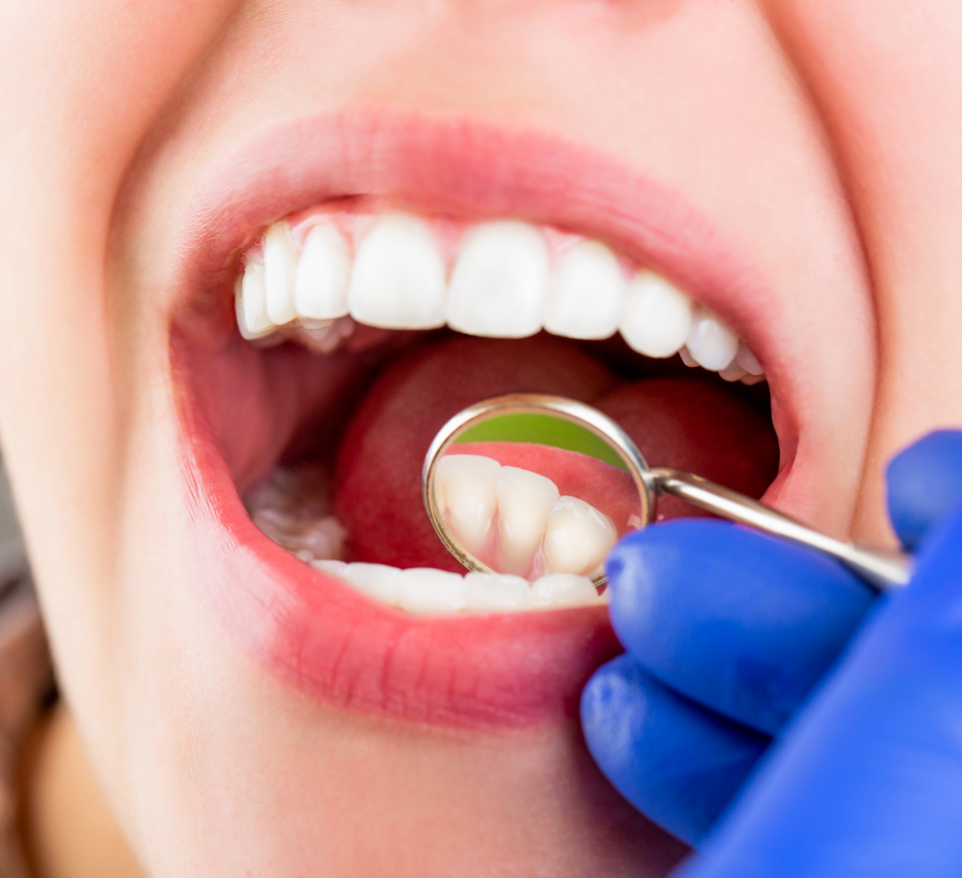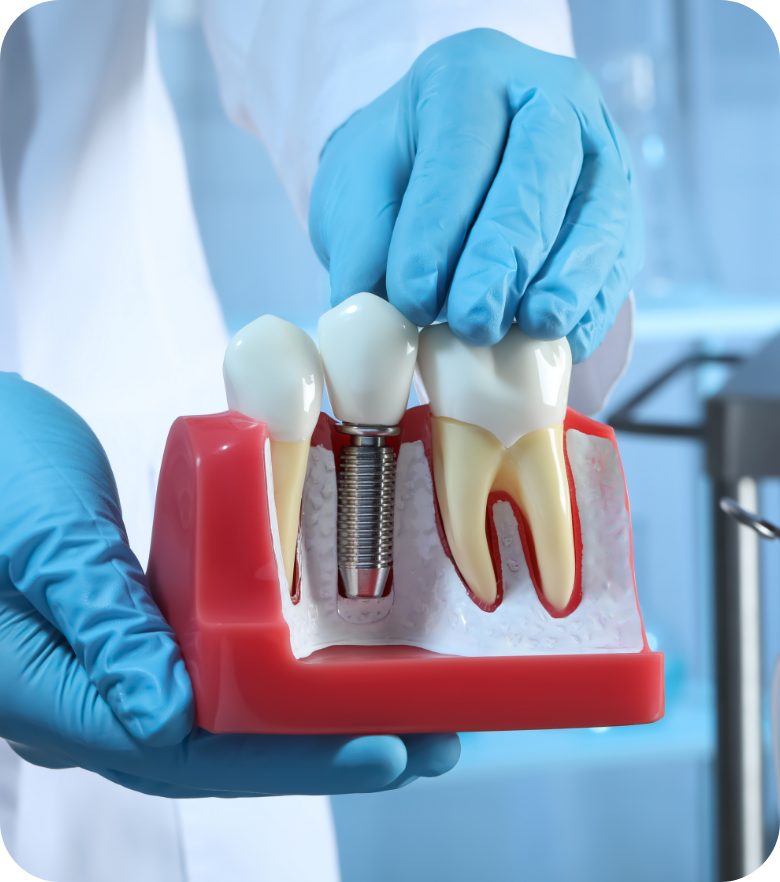

General Dentistry
Eugene General Dental Services
Enjoy Eugene’s Trustworthy
No-Nonsense Dental Practice
From extractions to tooth alignment, elderly to children, we can handle all of your dental needs no matter the age. Dr. Tillman and his staff are committed to provide your whole family quality dental care.
We know the trials of finding just the right dentist. There are so many variables with all family members. There is no concern too small or large for us to review with you. We pride ourselves in the care we provide you and your family. We welcome you to Tillman Family Dental!
What Is General Dentistry?
General dentistry manages your overall oral health care needs including diagnoses, treating gum care, root canals, fillings, crowns, veneers, bridges, and provides preventive education and direction on how to take care of your teeth.
- Complete exams, x-rays, and cleanings
- Fillings, root canals, and extractions
- Cosmetic dentistry, such as whitening
- Crowns, bridges, full and partial dentures
- Implant Crowns

Hygiene
Cleaning Services
Why is it Important to Get My Teeth Cleaned Professionally?
Getting your teeth cleaned is a crucial step in maintaining your oral health. We offer unique services to best suit your needs and work toward your future health goals. A cleaning is usually recommended every 6 months along with an oral exam. It is always advantageous to take preventative action against tooth or gum decay.
Patients Come First
We provide a comfortable atmosphere so you have a pleasant experience every time. Our staff is always conscientious of our patients and will adjust to suit any new needs that arise.

Composite Fillings
What Are Composite Fillings?
Composite fillings are a natural looking alternative to metal fillings. Depending on the decay, another material or restoration may be more suitable. We recommend you schedule an appointment where we can help select a filling method and material that will best suit your situation.
Additional Benefits of Composite Fillings
They are a great solution for chipped or broken teeth; and due to the nature of the composite fillings they bond to the natural tooth structure while providing additional support.
Root Canal Therapy
Root Canal Therapy (Endodontics)
Root Canals are performed to save a natural tooth that has been infected with decay or traumatized. A root canal is usually followed by a permanent restoration such as a crown, or in some cases, a filling. Many of our patients arrive with a fear of having root canal therapy because they assume it will be painful. We find that most patients report that the procedure is similar to having a filling placed.
What is a Root Canal?
The process involves removing the nerve and pulp of the damaged tooth. Once clean, the tooth is sealed to prevent an abscess and infection. The procedure is performed with the utmost care, but because of the nature of the surgery you may experience some sensitivity after the operation.
Care Post-Op
After the infection or decay has been removed you will be instructed in how to care for your teeth during the healing process. We also encourage a check up at a later date to inspect and make sure all is as it should be.
What Are The Reasons For Pulling A Tooth?
Although adult teeth (often called permanent teeth) were meant to last a lifetime, there are a few reasons when tooth removal is needed. The most common reason may be that a tooth is too badly damaged, from trauma, decay, or periodontal disease to be repaired. Other reasons include:
crowded mouth
A crowded mouth. If teeth are too big or numerous for a mouth, it is likely removing a few teeth may be recommended.
Infection
Infection. Tooth damage or decay can extend to the center pulp of the tooth, which contains the nerves and blood vessels. Bacteria in the mouth can enter the pulp, which can lead to infection. Pulling the tooth helps prevent the spread of infection.
Periodontal (Gum) Disease
Periodontal (Gum) Disease. If periodontal disease — an infection of the tissues and bones that surround and support the teeth — have caused loosening of the teeth, it may be necessary to pull the tooth or teeth.

Tooth removal
What Are The Steps To Tooth Removal?
As a first step, your dentist will need to anesthetize (“numb up”) both your tooth and the bone and gum tissue that surround it.
At this point in time, there is still no way for a dentist to predictably administer a local anesthetic except as an injection (a “shot”). We’ll admit that receiving one may hurt a bit. But we’ll also emphatically state that it doesn’t always.
Tooth Extractions and Oral Surgery
When necessary, Dr. Tillman performs most of his tooth extractions. occasionally other options are available such as a referral to the specialist. Options can be discussed during the exams with Dr. Tillman Usually an extraction is a quick service that takes less than an hour, however healing may take a few days.
Dentures
Although we strive to prevent teeth extractions, they do occur in some cases. Removable partial and full dentures are an option to replace the missing teeth. Partial dentures replace one or more missing teeth while a full denture replaces the entire arch. This process begins with an exam so the patient and Dr. Tillman can discuss the steps involved and decide on materials. There are a few appointments involved and a typical start to finish timeline of 6 weeks.
Cosmetic Dentistry
The Smile You’ve Always Wanted
Dr. Tillman creates treatment plans that work best with his patients based on their individual facial profiles. In addition to personalizing each treatment, he also factors in the longevity of different treatment methods to ensure proper care and stunning results.
What is Dental Bonding?
If you have damaged, chipped or cracked teeth Dental Bonding is an inexpensive solution to repair, fill gaps, and improve the shape of your smile.
The procedure is done using a natural colored resin to resemble teeth and is applied to problem areas. The bonding occurs when the substance has been shaped and hardened with a special light. It is a simple cosmetic procedure that produces immediate results.
What Are Dental Veneers?
Dental or porcelain veneers are thin, custom-made tooth-colored shells designed to bond to the front of the tooth to change and create a better appearance.
Dental veneers can be made from porcelain or from resin composite materials. Porcelain veneers resist stains better than resin veneers. Porcelain also better mimics the reflective properties of your natural teeth.
What is a Dental Bridge?
Dental bridges span the gap created by one or more missing teeth, providing a balanced bite, larger chewing surface and stability for existing teeth. A bridge is made up of two or more crowns for the teeth on either side of the gap used as anchors. These crowns are called abutment teeth. Dental bridges are supported by natural teeth or implants.
Same Day Crowns, Bridges, & Veneers
We offer same-day reconstructive dental care for crowns, bridges, and veneers. To get more details on these single-visit procedures visit our Same Day Services page.
Dental Implants

Implants are a multi-step process to replace missing teeth with a natural feel. The implant is placed by an oral surgeon and then a crown is completed at our office.

Teeth Whitening Services
Keep Your Smile White And Bright! Custom Made Whitening Kit
We offer a take-home custom whitening kit that is made here in the office. We take an impression of your teeth so that the trays fit perfectly. This ensures that you can whiten with a professional strength gel in the comfort of your home while minimizing contact with sensitive gum tissue.
Duration of Use
The whitening tray will be worn for a duration of time we determine based on the degree of discoloration. Typically they are worn 2-4 hours daily, or at night for up to 2 weeks to best achieve the desired whitening results.
Should I Whiten My Teeth?
Teeth whitening provides the best results for people who have overall good oral health and have maintained their teeth and gums to avoid cavities, fillings and gum restoration procedures. Consult us today to determine if teeth whitening is right for you.
Night Guards
Prevent Excess Wear Caused By Grinding And Clenching At Night
Teeth grinding, or bruxism, refers to excessive grinding of the teeth and/or excessive clenching of the jaw, usually occurring when one sleeps. If you wake up with jaw pain, tension headaches, or facial pain, you may be suffering from bruxism. Some people aren’t even aware they are grinding or clenching their teeth at night, until a visit to us reveals significant tooth enamel loss or damage to restorations.
Tension, stress, and anxiety experienced during the daytime can carry over to an individual’s sleep, and lead the person to grind his or her teeth together or clench the teeth unknowingly. Regardless of the cause, however, frequent clenching and grinding wears down the chewing surfaces of the teeth, reduces tooth enamel, and can result in a cracked or chipped tooth, crown, or filling.
How Do I Prevent My Teeth From Wearing?
Fortunately, there is a non-invasive and effective solution for teeth grinding, and the tooth enamel damage it can cause, in custom-fabricated nightguards. Nightguards are created through a non-invasive process that involves taking an impression of the bottom and top rows of teeth and sending them to a state-of-the-art lab. The result is a custom night guard that is flexible, comfortable, and personalized to your mouth.
How To Prevent Clenching And Grinding?
Although it’s important to wear your night guard consistently if you grind your teeth at night, you can also follow a few self-care tips to help to prevent your teeth grinding from worsening.
Reduce tension and stress
Whether you take a warm bath before bed, listen to soothing music, or exercise, practicing stress-relieving activities can help alleviate stress and tension.
Avoid alcohol and caffeine
In some patients, alcohol and caffeine can increase teeth-grinding tendencies.
Focus on relaxing jaw muscles
Make a conscious effort to keep your jaw relaxed. A warm washcloth against your cheek, sticking your tongue between your teeth, and avoiding chewing pencils, pens, and gum are all ways to train the muscles of your jaw to stay relaxed. Remember: lips together, teeth apart!
What Causes Snoring?
During sleep, muscles and soft tissues in the throat and mouth relax, shrinking the airway. This increases the amount of velocity of airflow during breathing. As the velocity of required air is increased, soft tissues like the soft palate and uvula vibrate. The vibrations of these tissues result in “noisy breathing” or snoring.
How Can I Prevent Snoring and What is Silent Nite?
Silent Nite is a custom-fabricated dental device that moves the lower jaw into a forward position, increasing space in the airway tube and reducing air velocity and soft tissue vibration. Special Slide-Link connectors are attached to transparent flexible lower and upper splints. The splints are custom laminated with heat and pressure to the model of your teeth. This allows the fit to be comfortable, permitting small movements of the jaw (TMJ) and allowing uninhibited oral breathing.


